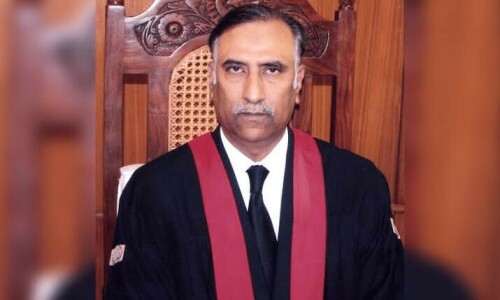Much hullabaloo was created at last month when my bill, calling for an Amendment to the Child Marriage Restraint Act by raising the age restriction for girls from 16 to 18, was put up for debate in the relevant Standing Committee, and will now be put to a vote in the Senate again in the next session.
I was suddenly swamped with both positive support and negative feedback – but neither of those reactions was extraordinary, and to me, 70 odd years after independence, therein lies the true tragedy.
We argue that no country can flourish without the active participation of its women, and that we believe children are the future of this land that we’ve fought and sacrificed for.
But when push comes to shove, we continue to be reluctant to protect them, and afford them the opportunities they need to blossom.
The reasons and justifications we produce are also multifold; poverty, misuse of the culture and tradition narratives, lack of education, a patriarchal system deeply embedded with power-related/political motivations.
But those are another matter – the exploration of the whys and wherefores has been done at some length, by many an author far more distinguished and better suited to the job.
My purpose lies in the other direction – to make my case for this change, and do what I can to ensure this particular piece of legislation passes through the two houses of our parliament.
And thus, I’d like to lay open before you my mind and reasoning as to why it is of the utmost importance to protect our girls from becoming child brides, in order for them to fulfill their true potentials as the cruxes of their families, and productive citizens of this great state.
Related: Obstetric fistula: Another reason CII is wrong on underage marriage
For a nation that sets great store by its founder’s ideals, it is often forgotten that opposition to child marriages was first brought to the forefront of social issues by none other than Quaid-e-Azam Mohammad Ali Jinnah, when he drafted and introduced the first Child Marriages Restraint Act in the subcontinent as early as 1929, as a member of the British Indian Legislative Assembly.
He was cognizant of the damage an inordinately early marriage has on the psyche and development of a child. This is in addition to other problems it exposes girls to, like health complications, domestic violence, physical, sexual and psychological abuse, HIV/Aids infections, education disruption, social isolation and exploitation.
The Family Planning Association of Pakistan (FPAP) warned some years ago that one woman dies every 20 minutes during childbirth, and that the major cause for high maternal mortality ratio - 276 per 100,000 live births - is child marriage.
To those who posit that this archaic practice affects but an insignificant fragment of the population, I’d recommend the data made available by Gallup, whereby in Pakistan, one in four women (24.7%) were married before they turned 18, compared with just 1.4% of men. This is about six percent of the population aged 15 and above (translation - 7 million people!) that was married between the ages of 15 and 16 years.
Also read: Married off for 'honour': Pakistan's child brides
This is not meant to detract in any manner from the fact that this practice is a globally acknowledged problem in many parts of the world. The United Nations Population Fund puts one in every four girls in developing countries into the category of marriage before 18, and one in nine under 15. But it is, at the very least, acknowledged as a detrimental and archaic practice, and great efforts are being made for its elimination.
Formally, Pakistan also acknowledges this, which is why it is signatory to United Nations Convention on the Rights of the Child (UNCRC) which identifies a “child” as “less than 18 years”, as well as Convention on the Elimination of Discrimination Against Women – two international human rights agreements which prohibit child marriage.
And yet, it has taken Pakistan 27 years from when it ratified the UNCRC in November, 1990 to take the initiative and introduce a bill in Senate in 2017 for passing the appropriate amendment in the Child Marriage Restraint Act 1929 to match its binding international commitments.
Delay in converting international obligations into national legislation is not uncommon, and can be a result of a multitude of factors including apathy and political motivations.
But it is important to note that when a state ratifies a treaty or convention, it is bound by international law to adhere to the commitments within, and subsequent failure to do so can adversely affect that state’s image and standing within the international community, which in turn can also impact on economic policies towards that state.
Pakistan’s sluggish pace in legislating our child rights commitments into law (specifically the Child Marriage Amendment), has been affecting our rankings in the Human Rights Index.
Read next: CII: Pushing Pakistan back to the caves
Ending child marriage is such an important international goal that eliminating the practice was added as a Sustainable Development Goal, to be achieved by 2030 as it ‘prioritised the prevalence of child marriage among girls as a key indicator of progress toward this target’.
This is in line with the findings of a research report published by the World Bank and the International Center for Research on Women (ICRW) that has found that Child marriage will cost developing countries trillions of dollars by 2030.
The trend towards ending child marriages is even acknowledged within the community of Islamic states at large, as is demonstrated by the 2009 OIC Khartoum Declaration: Towards a Brighter Future for our Children.
Article 26 of this declaration sets out a clear path encouraging Islamic countries to “take the necessary measures to eliminate all forms of discrimination against girls and all harmful traditional or customary practices, such as child marriage and female genital mutilation, in the light of the relevant declarations, instruments and conventions.”
To that end, the legal age for marriage in many other Islamic countries is 18 or above, such as Jordan (18), Libya (20), Morocco (18), Tunisia (18), Algeria (19), Oman (18), UAE (18). Surveys from these countries also indicate that over two-thirds of the population in fact encourages waiting until at least 21 before a girl is married.
This makes sense if one thinks about it rationally for a moment: Where people are not allowed to drive, vote or in any other way be legally considered an adult before the age of 18, why should marriage, which arguably requires even greater maturity, be the exception? Similarly why protect only boys and not girls under the guise of values or culture?
Young girls are not child brides. This is only the first step on the path to social progress, which is long and arduous, but more than ever I am certain that together we can and we will eliminate this practice, and move our country towards a better, brighter future.
Are you working to promote children’s rights in Pakistan? Tell us about your experiences at blog@dawn.com

















































